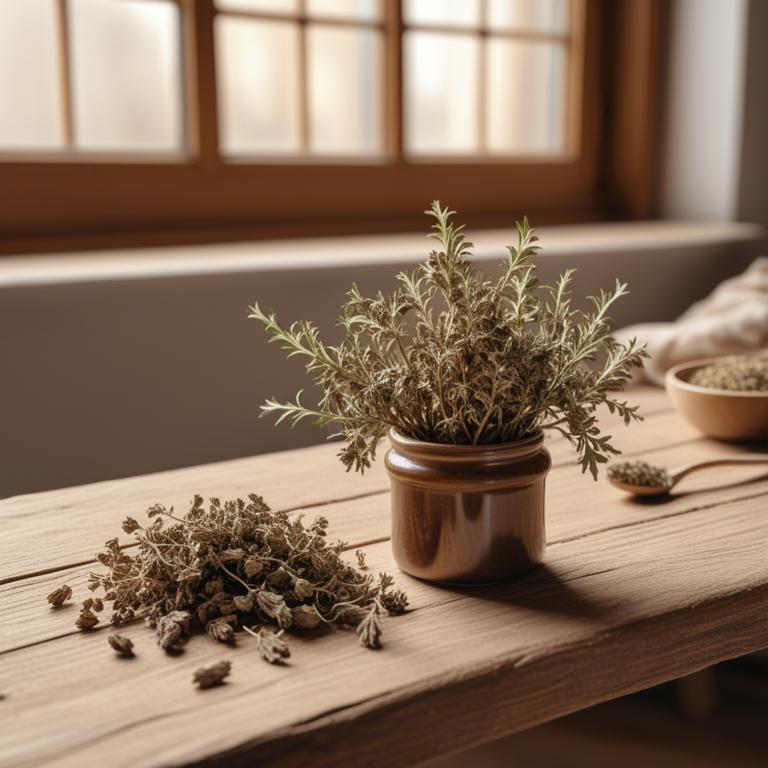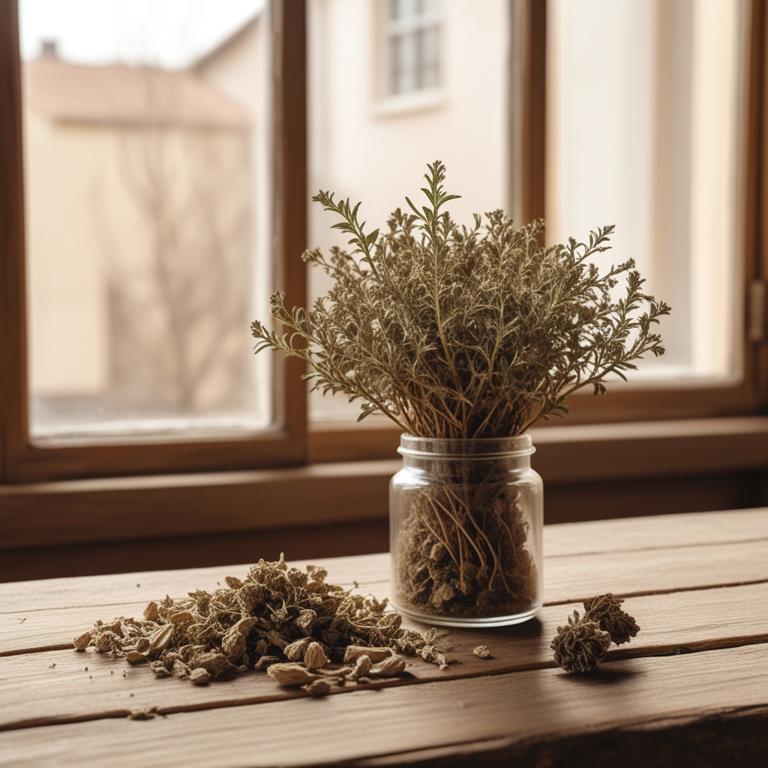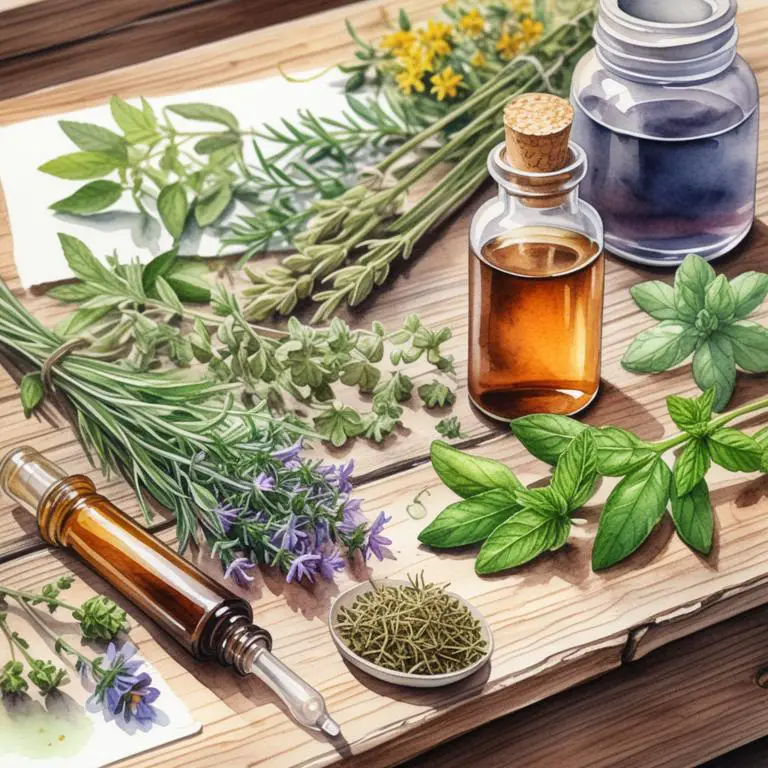Updated: Dec 1, 2024
Frozen Shoulder: Causes, Symptoms, and Natural Remedies with Medicinal Herbs

Frozen shoulder, also known as adhesive capsulitis, is a painful condition where the shoulder joint becomes stiff and inflamed, making it difficult to move or perform daily activities.
Imagine being unable to lift your child or even put on a shirt without wincing in pain. It can be debilitating and frustrating. The causes of frozen shoulder are often unclear, but it's believed to be linked to injury, overuse, or even medical conditions like diabetes or thyroid problems. The good news is that there are some herbal remedies that may help alleviate the symptoms. Turmeric, with its anti-inflammatory properties, is often used to reduce pain and swelling.
Ginger, another natural anti-inflammatory, can also be helpful in soothing the affected joint. Willow bark, containing salicin, a compound similar to aspirin, can provide relief from pain and stiffness. To use these herbs, you can try making teas by steeping them in hot water or taking them as supplements. Drinking turmeric tea, for example, can be as simple as mixing turmeric powder with hot water and straining it before drinking. Similarly, you can make a ginger tea by steeping fresh ginger in hot water. Willow bark tea can be made by steeping the bark in hot water, then straining and drinking it.
While these herbal remedies may not cure frozen shoulder, they may help alleviate the symptoms and make it more manageable.
Table of Contents
- What are the underlying factors causing frozen shoulder?
- What are the advantages of using herbs as a treatment for frozen shoulder?
- What are the key medicinal herbs used in the treatment of frozen shoulder?
- What herbal remedies are commonly prescribed for frozen shoulder?
- What herbs pose a risk for individuals with a frozen shoulder?
- FAQ
What are the underlying factors causing frozen shoulder?
The main causes of frozen shoulder are a combination of various medical conditions and factors that lead to inflammation and scarring in the shoulder joint.
Diabetes is a significant cause of frozen shoulder due to the high levels of sugar in the blood that can damage the tendons and ligaments in the shoulder, leading to inflammation and scarring. People with diabetes are more prone to developing frozen shoulder, especially if their blood sugar levels are not well-controlled. CVA, or a stroke, can also cause frozen shoulder. When a stroke occurs, it can damage the nerves that control the muscles in the shoulder, leading to weakness, stiffness, and limited mobility. This can cause the shoulder joint to become inflamed and scarred, resulting in frozen shoulder. Hyperthyroidism, or an overactive thyroid gland, can also cause frozen shoulder. The excess hormones produced by the thyroid gland can cause inflammation and scarring in the shoulder joint, leading to stiffness and limited mobility. This condition is more common in women and can be treated with medication or surgery.
Surgery, particularly shoulder surgery, can also lead to frozen shoulder. When the shoulder joint is manipulated or operated on, it can cause inflammation and scarring, leading to stiffness and limited mobility. This is a common complication of shoulder surgery and can take several months to a year or more to recover from. Rheumatoid Arthritis, a type of autoimmune disorder, can also cause frozen shoulder. The inflammation and scarring caused by rheumatoid arthritis can affect the shoulder joint, leading to stiffness and limited mobility. This condition can be treated with medication, physical therapy, and lifestyle changes. Hypothyroidism, or an underactive thyroid gland, can also cause frozen shoulder. The lack of hormones produced by the thyroid gland can cause inflammation and scarring in the shoulder joint, leading to stiffness and limited mobility.
This condition is more common in women and can be treated with medication or lifestyle changes.
What are the advantages of using herbs as a treatment for frozen shoulder?
Using herbs for frozen shoulder can be very helpful.
They can reduce inflammation and pain in the shoulder joint. This is because the herbs have natural anti-inflammatory properties that help to calm down the swelling and irritation. As a result, patients can experience less stiffness and discomfort when moving their arm.
The herbs can also improve circulation and promote healing in the affected area. By reducing scar tissue and adhesions, they can also help to restore normal movement and flexibility in the shoulder. Additionally, the herbs can help to reduce muscle spasms and tension, which can contribute to pain and stiffness. By using herbs, patients may be able to reduce their reliance on pain medication and other treatments.
They can also help to promote a sense of calm and relaxation, which can be beneficial for managing chronic pain.
What are the key medicinal herbs used in the treatment of frozen shoulder?

Frozen shoulder is a painful condition that affects many people.
To ease the pain and discomfort, herbs can be a great help. Let's take a look at some of the key herbs that can help. One of the main herbs is turmeric (Curcuma longa), which is known for its anti-inflammatory properties. It contains a compound called curcumin, which helps reduce swelling and pain in the shoulder. When applied topically in the form of a cream or oil, turmeric can directly target the affected area and provide relief. Another herb that can help is ginger (Zingiber officinale), which is also known for its anti-inflammatory properties. It contains compounds that help reduce pain and swelling, making it easier to move the shoulder. Ginger can be consumed as tea, added to food, or taken as a supplement.
Cayenne pepper (Capsicum annuum) is a natural pain reliever that can be applied topically to the affected area. It contains capsaicin, a compound that blocks the production of a chemical called substance P, which transmits pain signals to the brain. By applying cayenne pepper cream or oil to the shoulder, you can reduce pain and discomfort. Licorice root (Glycyrrhiza glabra) is another herb that can help with frozen shoulder. It contains compounds that help reduce inflammation and promote healing. Licorice root can be consumed as tea or added to food, but it's essential to use it in moderation due to its potential side effects. Black pepper (Piper nigrum) may not be the first herb that comes to mind for frozen shoulder, but it's actually quite helpful. It contains a compound called piperine, which helps improve blood circulation and reduce inflammation. By applying black pepper oil or cream to the affected area, you can promote healing and reduce pain.
Remember to always consult with a healthcare professional before using any herbs, especially if you're already taking medication or have a medical condition.
What herbal remedies are commonly prescribed for frozen shoulder?
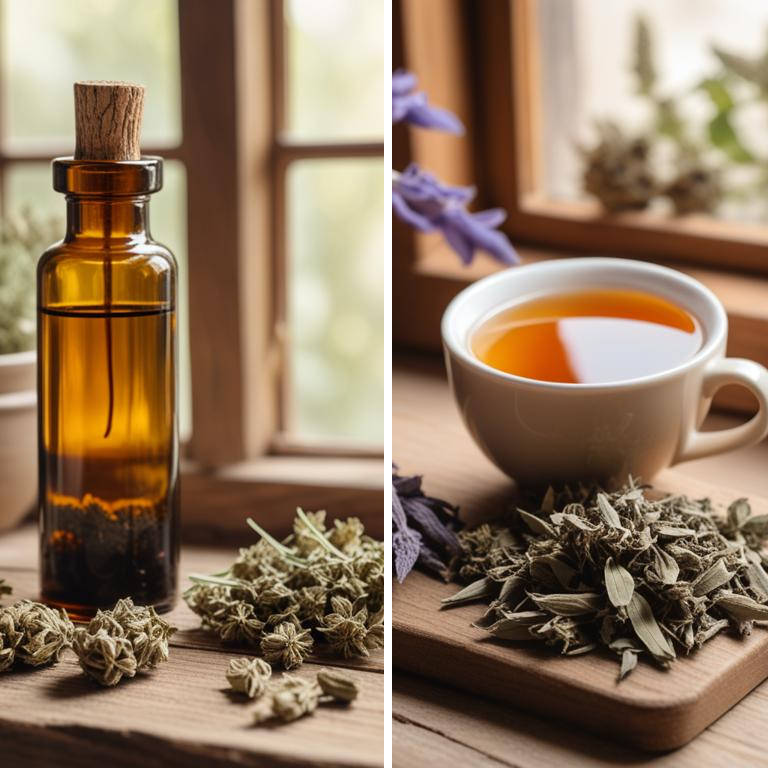
When it comes to relieving the pain and stiffness of frozen shoulder, herbal preparations can be a great option.
One of the ways to use herbs is through a tincture, which is a concentrated liquid extract of the plant. Tinctures can be added to water or taken directly to help reduce inflammation and ease pain. Another way to use herbs is by making a decoction, which is a strong tea made by steeping the plant in hot water. Decoctions can be more effective than teas because they involve boiling the plant, which releases more of its medicinal properties. Herbs like turmeric and ginger are commonly used in decoctions to reduce inflammation and promote healing.
Herbal capsules are also a convenient way to take herbs. They contain a powdered form of the plant, which can be easily swallowed with water. Capsules made from herbs like omega-3 rich flaxseeds or anti-inflammatory boswellia can help reduce pain and inflammation associated with frozen shoulder. A salve is a topical cream made from herbs that can be applied directly to the affected area. Salves made from herbs like arnica or St. John's Wort can help reduce pain and inflammation, and promote healing. Finally, herbal teas can be a soothing way to relieve frozen shoulder symptoms.
Herbs like chamomile and lavender can help calm the mind and body, reducing stress and promoting relaxation.
Additional Resources:
What herbs pose a risk for individuals with a frozen shoulder?
If you have frozen shoulder, it's best to steer clear of certain herbs that might make things worse.
For instance, Aristolochia clematitis is known to cause kidney damage, which could be a disaster if you're already experiencing pain and stiffness in your shoulder. The same goes for Hypericum perforatum - while it's sometimes used to ease anxiety, its effects on the kidneys can be too much for someone with frozen shoulder to handle. Thymus serpyllum might seem like a harmless herb, but its active compounds can actually slow down blood clotting, which could be a problem if you're experiencing bleeding or bruising due to your frozen shoulder.
On the other hand, Aconitum napellus and Aconitum carmichaelii are both part of the aconitum family, which contains a toxin that can be toxic to the heart, liver, and nervous system. With frozen shoulder, your body is already stressed, so introducing these toxins could be a recipe for disaster. It's always a good idea to consult with a healthcare professional before using any herbal remedies, especially if you're dealing with a condition like frozen shoulder.
They can help you navigate which herbs are safe and which ones to avoid.
FAQ
Are there any specific herbs that can prevent frozen shoulder?
Turmeric and ginger are sometimes used to help reduce inflammation in the body, which can be a factor in frozen shoulder.
These herbs have anti-inflammatory properties that may help alleviate pain and stiffness.
Some people also use boswellia, another herb with anti-inflammatory properties, to help manage frozen shoulder symptoms.
Is it safe to use herbal remedies for frozen shoulder during pregnancy?
During pregnancy, it's best to be cautious when using herbal remedies for frozen shoulder.
Some herbs can affect the baby's development or trigger complications. It's also hard to know the exact dosage and potential interactions with other medications.
If you're considering herbal remedies, choose ones that are known to be safe during pregnancy and use them under close guidance.
Are there any herbs that can reduce the frequency of frozen shoulder?
Some herbs may help reduce the frequency of frozen shoulder.
Turmeric contains curcumin, which has anti-inflammatory properties. Ginger also has anti-inflammatory effects, which may help reduce pain and stiffness.
Other herbs like boswellia and willow bark have similar properties, but more research is needed to confirm their effectiveness.
Can i combine different herbal remedies for frozen shoulder?
Combining herbal remedies for frozen shoulder can be complex.
Some herbs like turmeric and ginger have anti-inflammatory properties, while others like arnica and cayenne pepper help with pain relief. Mixing different herbs may interact or reduce their effectiveness.
It's best to research individual herbs and their recommended dosages before combining them.
Related Articles
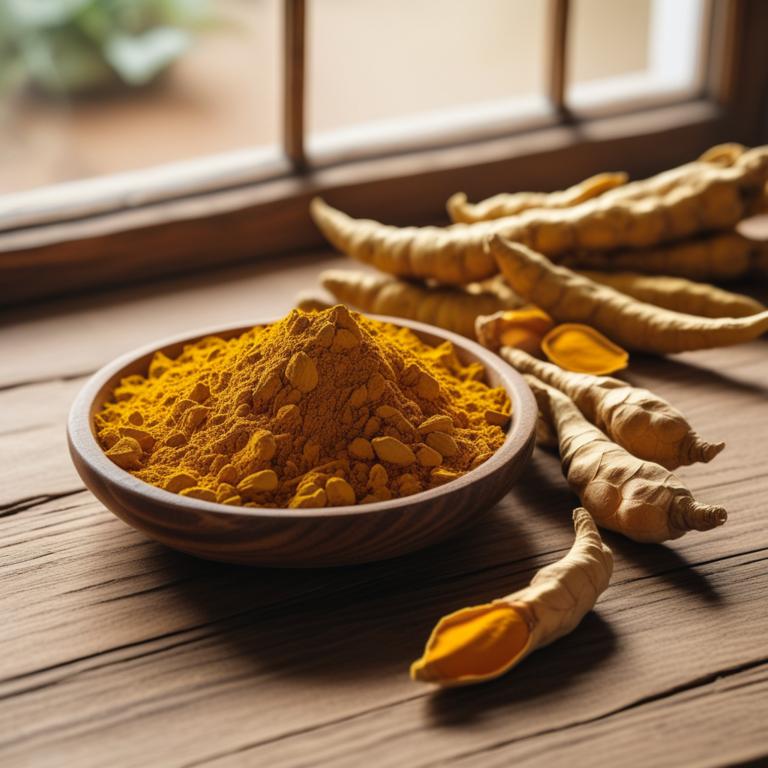
Causes, Symptoms, and Herbal Preparations for Plantar Fasciitis

Ankylosing Spondylitis: Causes, Medicinal Herbs, and Natural Supplements for Joint Health
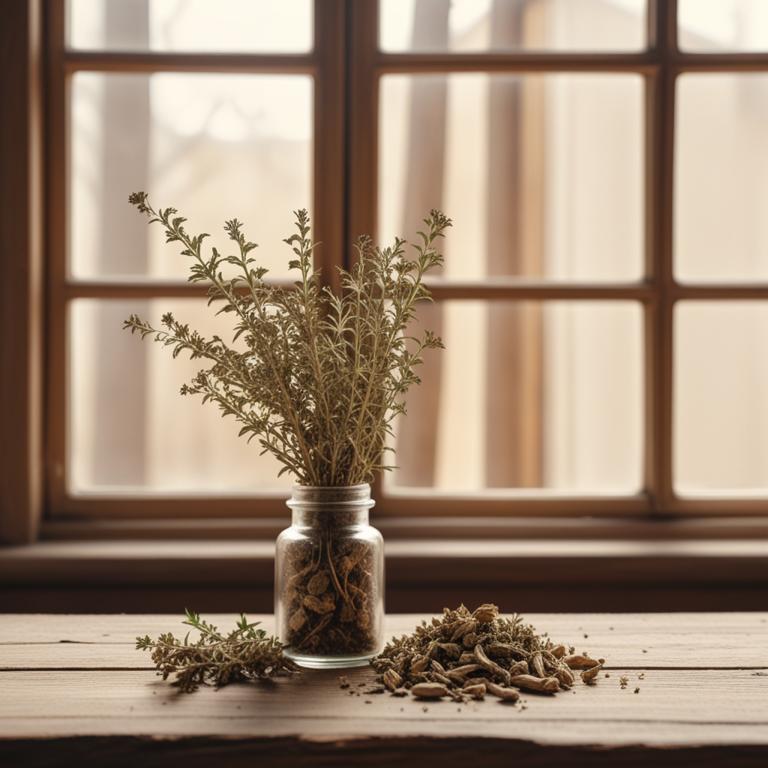
Knee Pain: A Comprehensive Guide to Medical Causes and Herbal Solutions

Neck Pain Relief Through Medicinal Herbs and Herbal Preparations
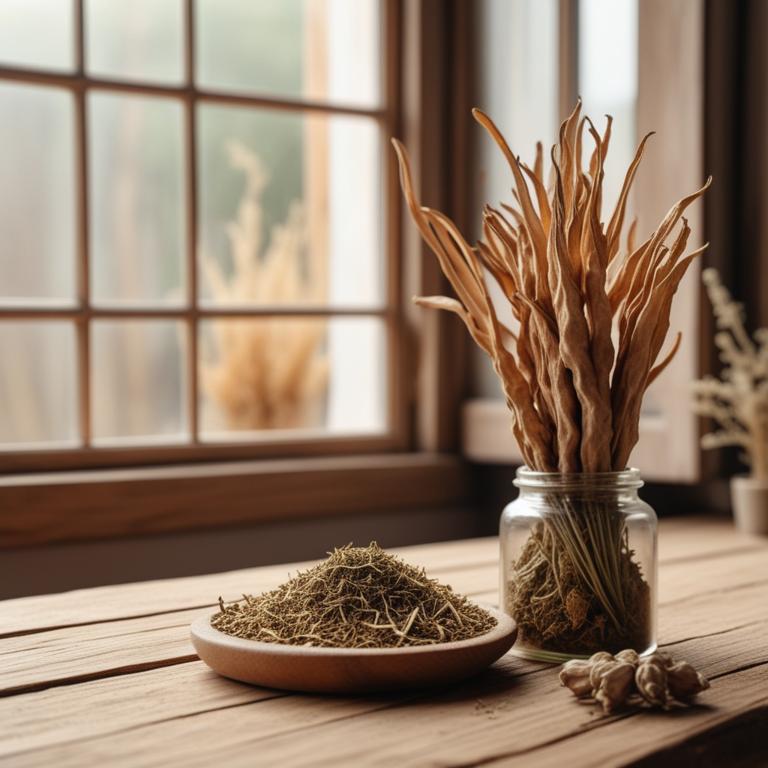
Osteoporosis: Exploring Causes, Medicinal Herbs, and Herbal Preparations
